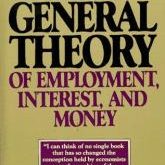The Lady Tasting Tea En av mina absoluta favoriter i statistikhyllan är David Salsburgs insiktsfulla statistikhistoria The Lady Tasting Tea. Boken är full av djupa och värdefulla reflektioner kring statistikens roll i modern vetenskap. Salsburg är, precis som tidigare Keynes, tveksam till hur många samhällsvetare — inte minst ekonomer — okritiskt ofta bara antar att man kan applicera statistikteorins sannolikhetsfördelningar på sitt eget...
Read More »Financialization revisited: the economics and political economy of the vampire squid economy
This paper explores the economics and political economy of financialization using Matt Taibbi’s vampire squid metaphor to characterize it. The paper makes five innovations. First, it focuses on the mechanics of the “vampire squid” process whereby financialization rotates through the economy loading sector balance sheets with debt. Second, it identifies the critical role of government […]
Read More »Robert Lucas and his Keynesian credentials
Robert Lucas and his Keynesian credentials In his Keynote Address to the 2003 History of Political Economy Conference, Robert Lucas said: Well, I’m not here to tell people in this group about the history of monetary thought. I guess I’m here as a kind of witness from a vanished culture, the heyday of Keynesian economics. It’s like historians rushing to interview the last former slaves before they died, or the last of the people who remembered growing up in...
Read More »Japan’s economic woes
.[embedded content]
Read More »Top 20 heterodox economics books
Top 20 heterodox economics books Karl Marx, Das Kapital (1867) Thorstein Veblen, The Theory of the Leisure Class (1899) Joseph Schumpeter, The Theory of Economic Development (1911) Nikolai Kondratiev, The Major Economic Cycles (1925) Gunnar Myrdal, The Political Element in the Development of Economic Theory (1930) John Maynard Keynes, The General Theory (1936) Karl Polanyi, The Great Transformation (1944) Paul Sweezy, Theory of Capitalist Development...
Read More »Why MMT rejects the loanable funds theory
Why MMT rejects the loanable funds theory Government deficits always lead to a dollar-for-dollar increase in the supply of net financial assets held in the nongovernment bucket. That’s not a theory. That’s not an opinion. It’s just the cold hard reality of stock-flow consistent accounting. So fiscal deficits — even with government borrowing — can’t leave behind a smaller supply of dollar savings. And if that can’t happen, then a shrinking pool of dollar...
Read More »Microfoundational incoherence
Defenders of microfoundations and its rational expectations equipped representative agent’s intertemporal optimization often argue as if sticking with simple representative agent macroeconomic models doesn’t impart a bias to the analysis. Yours truly unequivocally rejects that unsubstantiated view, and has given the reasons why here. These defenders often also maintain that there are no methodologically coherent alternatives to microfoundations modeling. That allegation is of...
Read More »Cherry-picking economic models
How would you react if a renowned physicist, say, Richard Feynman, was telling you that sometimes force is proportional to acceleration and at other times it is proportional to acceleration squared? I guess you would be unimpressed. But actually, what most mainstream economists do amounts to the same strange thing when it comes to theory development and model modification. In Dani Rodrik’s Economics Rules — just to take one illustrative example — the proliferation of economic...
Read More »It’s not the debt we need to fix, stupid! It’s our thinking.
It’s not the debt we need to fix, stupid! It’s our thinking. The ad nauseam repeated claim that our public debt is excessive and that we have to balance the public budget is nothing but absolute nonsense. The harder politicians — usually on the advice of mainstream establishment economists — try to achieve balanced budgets for the public sector, the less likely they are to succeed in their endeavour. And the more the citizens have to pay for the concomitant...
Read More »The real crises we are facing
The real crises we are facing The fact that 21 percent of all children in the United States live in poverty—that’s a crisis. The fact that our infrastructure is graded at a D+ is a crisis. The fact that inequality today stands at levels last seen during America’s Gilded Age is a crisis. The fact that the typical American worker has seen virtually no real wage growth since the 1970s is a crisis. The fact that forty-four million Americans are saddled with...
Read More » Heterodox
Heterodox







